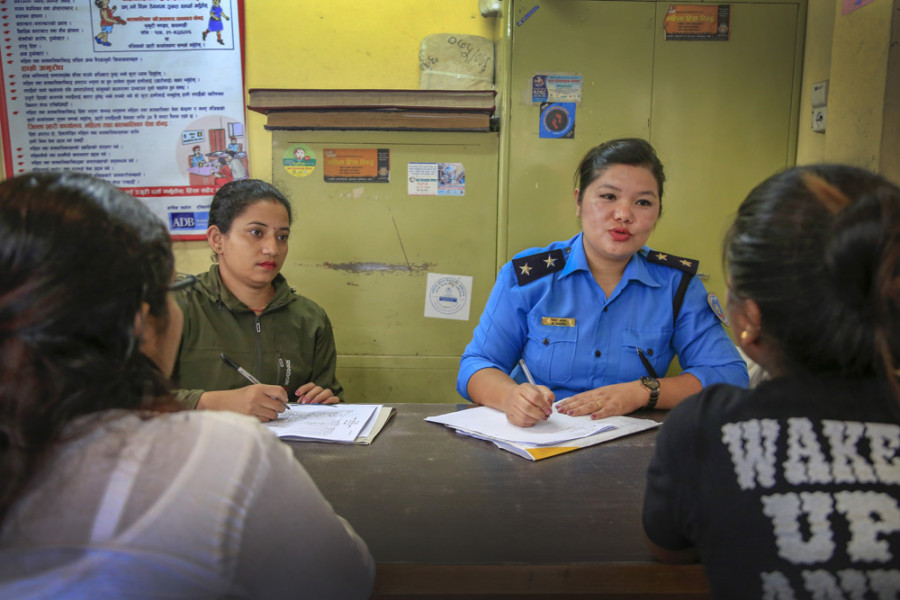National
In criminal cases, police often fail to ensure privacy or security for complainants, resulting in threats and bribes
Threats and bribes can lead the complainant to ultimately change their statements in courts, weakening the case and resulting in a lack of conviction.
Shuvam Dhungana
Last week, a 26-year-old woman, who came to Kathmandu from Itahari looking for a job, was allegedly raped by two men.
Following the incident, the woman went to the Budhanilkantha Metropolitan Police Circle on February 25 to file a complaint.
Acting on the complaint, police arrested Bishal and Subash Sangraula, permanent residents of Jhapa currently living in Budhanilkantha. In her complaint, the woman had stated that Bishal and Subash, whom she met on Facebook, lured her to Kathmandu with the offer of a job. When she arrived in the city, she was taken to a hotel in Bhaktapur and subsequently raped, the woman told police.
Although the arrests were made soon after the complaint was filed, police neither provided security to the victim nor maintained her privacy. After reports related to her complaint were republished in the media, she received calls from not only her relatives, but also the kin of the Sangraulas, who asked her to withdraw her complaint.
“She was even offered a million rupees in cash to withdraw the complaint,” said Pradeep Dangol of Kumudini, a non-profit organisation that sheltered the woman following the incident. “The woman’s family accepted an offer and forced her to withdraw the case and return home.”
This was not the first time that the police’s failure in providing security to the victim and keeping their details private directly affected a case, say rights defenders.
“The department does not prioritise the privacy of the victims; they rather make the details of the accused public in the media to gain popularity,” said Gobinda Sharma Paudyal, a member of the National Human Rights Commission. “Although they do not disclose the victim’s name, they provide information such as their address and age. People can easily identify the victim with the information.”
Once the complainant is identified by the media or the friends and family of the accused, they can then intimidate or bribe complainants into withdrawing the case. In such instances, the police should ideally offer some form of security to victims but police officials say that this is not possible in all cases.
“It’s not possible to provide security to all victims and witnesses as there are hundreds of cases and final verdicts in most cases take over a year,” said Uttam Raj Subedi, chief of the Kathmandu Metropolitan Police Range. “But if the victim receives threats, we do provide security by mobilising personnel in civvies.”
Most often, victims themselves don’t realise that they might receive threats after filing a complaint, and therefore refrain from requesting security, says former deputy inspector general Hemanta Malla.
“It is not only the police; even victims do not think about their own security and the threats they might receive,” he said.
Complainants might receive threats and they could change their statements because of such threats, says Subedi.
“Such changes usually do not affect the investigation, but they do affect the court’s decision,” he said. “This is one of the reasons why many cases investigated by police do not result in convictions.”
Even in the attempted rape case aganst former speaker Krishna Bahadur Mahara, the woman who filed a complaint at the Baneshwor police station on October 4 accusing Mahara of attempted rape later changed her statement in court.
“The complainant [in the Mahara case] went hostile after filing the complaint. There was nothing we could do as security is provided only if the victim requests it,” said Senior Superintendent Subedi.
Police, however, say that they are doing their bit to maintain the privacy of complainants. Deputy Inspector General Biswaraj Pokharel, chief of the Ranipokhari Metropolitan Police Office, said that police even change the name of the victim while filing complaints.
“We change the name even when writing the first information report, if necessary. The real name is kept safe in a sealed envelope,” said Pokharel. “However, neighbours of the complainant or their relatives might leak the information to the media. It is difficult to stop such information getting out.”




 14.24°C Kathmandu
14.24°C Kathmandu















